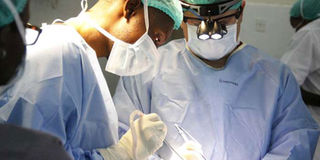About 600 EA doctors to undergo advanced cancer, neurology training

Surgeons operate on a child at Moi Teaching and Referral Hospital in Eldoret town on July 19, 2016. PHOTO | JARED NYATAYA | NATION MEDIA GROUP
What you need to know:
- Kenya, for instance, has about 22 neurosurgeons — 12 of which are paediatrician neurologists — for the over 44 million population.
- Tanzania and Rwanda fare much worse with only five, seven and three specialists respectively for their burgeoning populations.
About 600 medical specialists in East Africa will undergo a four-year medical training fellowship in a move expected to help improve rate of early detection and treatment of cancer and neurological diseases.
The fellowship is also expected to address the ratio of doctors to patients in the region’s growing population.
Kenya, for instance, has about 22 neurosurgeons — 12 of which are paediatrician neurologists — for the over 44 million population.
This is less by nearly 200 neurologists required for the population.
On the other hand, Uganda, Tanzania and Rwanda fare much worse with only five, seven and three specialists respectively for their burgeoning populations.5
This is despite the World Health Organisation recommendation of 200 specialists for Uganda and 275 for Tanzania.
The training scheme — which will also include a medical fellowship — is the brainchild of the East African Development Bank (EADB) and the British Council in partnership with the Royal College of Physicians, London.
It was unveiled on Friday in Nairobi, Kenya.
In the first three years of the project, the programme will conduct a series of East-Africa based residential five to seven days training courses in neurology and oncology which will be delivered by a mixed faculty from the UK and East Africa.
Health Cabinet Secretary Cleopa Mailu launched the training and lauded it as a measure that will ensure that East African residents do not have to travel abroad for treatment, which costs about $150 million annually.
Dr Mailu said on Friday in Nairobi: “We know some of the patients are going abroad not for cure but for palliative care which can be offered in the region and thus a waste of money.”
He added: “What we need to think about going forward is how we can bring down the cost of chemotherapy and how our people can access timely diagnosis and treatment.”
According to the EADB director general Vivienne Yeda, the training will boost the medical fraternity’s capacity in the region by availing qualified professionals who will tackle various cancers — even as 50 Kenyans die daily from various forms of cancer — and other neurological disorders.
British Council regional director for sub-Sahara Africa, Mandy Johnson said: “We hope that the programme will lead to better health for the people of East Africa and ease the growing burden that non-communicable diseases put on the economies of East Africa.”
At the same time, the CEO of the Royal College of Physicians (RCP) Ian Bullock, added that the programme will aid in improving not only the skills of the doctor but also help in saving lives;
“I am extremely proud that we have this opportunity to use the RCP’s expertise to support our colleagues in the East African region. This programme is an excellent example of the RCP's aim to improve care for patients and to develop physicians throughout their career by increasing access to high quality postgraduate training”





